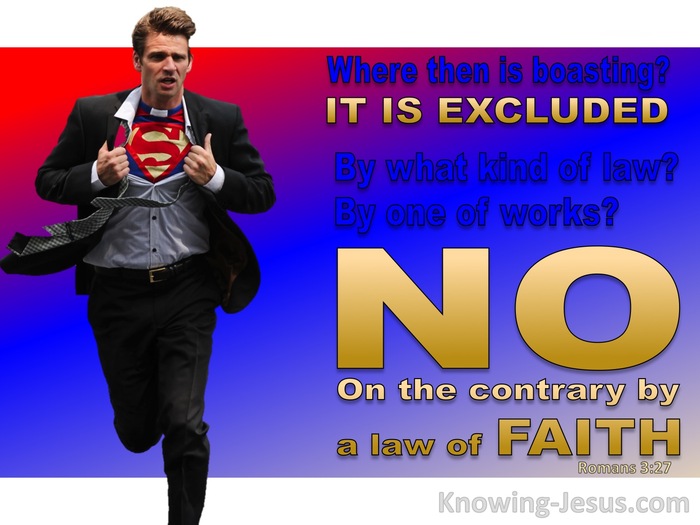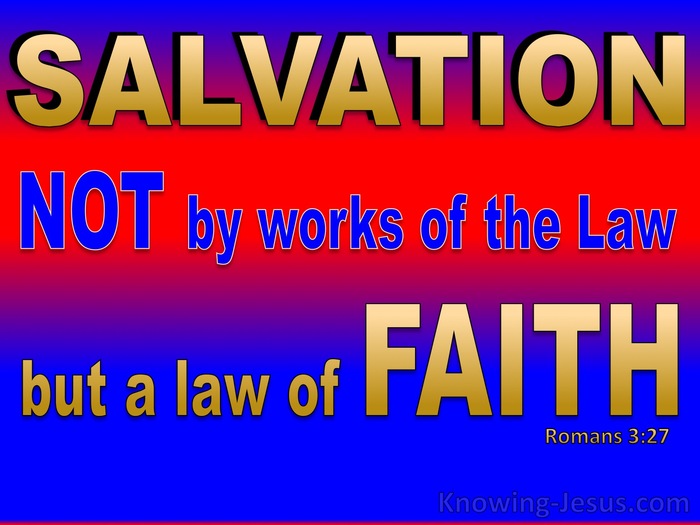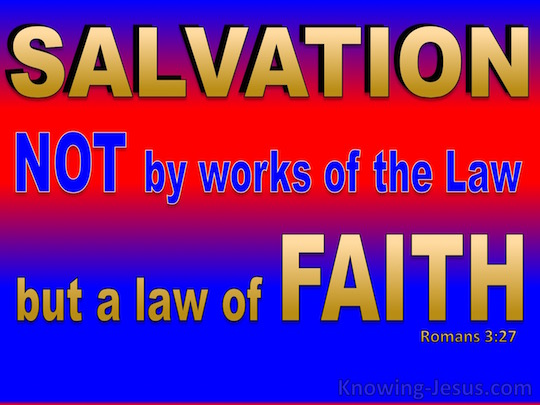Parallel Verses
NET Bible
Where, then, is boasting? It is excluded! By what principle? Of works? No, but by the principle of faith!
New American Standard Bible
Where then is
King James Version
Where is boasting then? It is excluded. By what law? of works? Nay: but by the law of faith.
Holman Bible
Where then is boasting?
International Standard Version
What, then, is there to boast about? That has been eliminated. On what principle? On that of actions? No, but on the principle of faith.
A Conservative Version
Where then is the boasting? It is excluded. By what law, of works? No, but by a law of faith.
American Standard Version
Where then is the glorying? It is excluded. By what manner of law? of works? Nay: but by a law of faith.
Amplified
Then what becomes of [our] boasting? It is excluded [entirely ruled out, banished]. On what principle? On [the principle of good] works? No, but on the principle of faith.
An Understandable Version
Where then is the [basis for] boasting [i.e., over being right with God]? There is not any. Is it by [obedience to] a law? Is it by doing certain deeds? Not at all, but by a law of faith.
Anderson New Testament
Where, then, is boasting? It is excluded. By what law? Of works? No; but by the law of faith.
Bible in Basic English
What reason, then, is there for pride? It is shut out. By what sort of law? of works? No, but by a law of faith.
Common New Testament
Where then is our boasting? It is excluded. On what law? On the law of works? No, but on the law of faith.
Daniel Mace New Testament
what reason then is there for boasting? it is excluded. what, by the ceremonial law? no: but by the law of faith.
Darby Translation
Where then is boasting? It has been excluded. By what law? of works? Nay, but by law of faith;
Godbey New Testament
Then where is boasting? It is excluded. By what law? of works? No; but by the law of faith.
Goodspeed New Testament
Then what becomes of our boasting? It is shut out. On what principle? What a man does? No, but whether a man has faith.
John Wesley New Testament
Where is boasting then? It is excluded. By what law? Of works?
Julia Smith Translation
Where then boasting? It was excluded. By what law? of works? No: but by the law of faith.
King James 2000
Where is boasting then? It is excluded. By what law? of works? Nay: but by the law of faith.
Lexham Expanded Bible
Therefore, where [is] boasting? It has been excluded. By what kind of law? Of works? No, but by a law of faith.
Modern King James verseion
Then where is the boasting? It is excluded. Through what law? Of works? No, but through the law of faith.
Modern Spelling Tyndale-Coverdale
Where is then thy rejoicing? It is excluded. By what law? By the law of works? Nay: but by the law of faith.
Moffatt New Testament
Then what becomes of our boasting? It is ruled out absolutely. On what principle? On the principle of doing deeds? No, on the principle of faith.
Montgomery New Testament
Then what becomes of boasting? It is shut out. What sort of law forbids it? A law of works? No, but a law of faith.
New Heart English Bible
Where then is the boasting? It is excluded. By what manner of law? Of works? No, but by a law of faith.
Noyes New Testament
Where then is the boasting? It is excluded. By what law? of works? Nay; but by the law of faith.
Sawyer New Testament
Where then is the boasting [of the Jew]? It is excluded. By what law? Of works? No; but by the law of faith.
The Emphasized Bible
Where, then, the boasting! It is excluded. Through what kind of law? Of works? Nay! but through a law of faith:
Thomas Haweis New Testament
Where then is boasting? It is excluded. By what law? of works? No: but by the law of faith.
Twentieth Century New Testament
What, then, becomes of our boasting? It is excluded. By what sort of Law? A Law requiring obedience? No, a Law requiring faith.
Webster
Where is boasting then? It is excluded. By what law? of works? No; but by the law of faith.
Weymouth New Testament
Where then is there room for your boasting? It is for ever shut out. On what principle? On the ground of merit? No, but on the ground of faith.
Williams New Testament
So where has human boasting gone? It was completely shut out. On what principle? On that of doing something? No, but on the principle of faith.
World English Bible
Where then is the boasting? It is excluded. By what kind of law? Of works? No, but by a law of faith.
Worrell New Testament
Where, then, is the boasting? It was excluded. By what manner of law? Of works? Nay; but by a law of faith.
Worsley New Testament
Where then is boasting? it is excluded: by what law? of works? no: but by the law of faith.
Youngs Literal Translation
Where then is the boasting? it was excluded; by what law? of works? no, but by a law of faith:
Themes
Interlinear
Dia
Dia
References
Word Count of 37 Translations in Romans 3:27
Prayers for Romans 3:27
Verse Info
Context Readings
Boasting Excluded
26 This was also to demonstrate his righteousness in the present time, so that he would be just and the justifier of the one who lives because of Jesus' faithfulness. 27 Where, then, is boasting? It is excluded! By what principle? Of works? No, but by the principle of faith! 28 For we consider that a person is declared righteous by faith apart from the works of the law.
Cross References
Romans 2:23
You who boast in the law dishonor God by transgressing the law!
Romans 4:2
For if Abraham was declared righteous by the works of the law, he has something to boast about -- but not before God.
1 Corinthians 1:29-31
so that no one can boast in his presence.
Romans 2:17
But if you call yourself a Jew and rely on the law and boast of your relationship to God
Ezekiel 16:62-63
I will establish my covenant with you, and then you will know that I am the Lord.
Ezekiel 36:31-32
Then you will remember your evil behavior and your deeds which were not good; you will loathe yourselves on account of your sins and your abominable deeds.
Zephaniah 3:11
In that day you will not be ashamed of all your rebelliousness against me, for then I will remove from your midst those who proudly boast, and you will never again be arrogant on my holy hill.
Mark 16:16
The one who believes and is baptized will be saved, but the one who does not believe will be condemned.
Luke 18:9-14
Jesus also told this parable to some who were confident that they were righteous and looked down on everyone else.
John 3:36
The one who believes in the Son has eternal life. The one who rejects the Son will not see life, but God's wrath remains on him.
Romans 3:19
Now we know that whatever the law says, it says to those who are under the law, so that every mouth may be silenced and the whole world may be held accountable to God.
Romans 7:21
So, I find the law that when I want to do good, evil is present with me.
Romans 7:23
But I see a different law in my members waging war against the law of my mind and making me captive to the law of sin that is in my members.
Romans 7:25
Thanks be to God through Jesus Christ our Lord! So then, I myself serve the law of God with my mind, but with my flesh I serve the law of sin.
Romans 8:2
For the law of the life-giving Spirit in Christ Jesus has set you free from the law of sin and death.
Romans 9:11
even before they were born or had done anything good or bad (so that God's purpose in election would stand, not by works but by his calling) --
Romans 9:32
Why not? Because they pursued it not by faith but (as if it were possible) by works. They stumbled over the stumbling stone,
Romans 10:5
For Moses writes about the righteousness that is by the law: "The one who does these things will live by them."
Romans 11:6
And if it is by grace, it is no longer by works, otherwise grace would no longer be grace.
1 Corinthians 4:7
For who concedes you any superiority? What do you have that you did not receive? And if you received it, why do you boast as though you did not?
Galatians 2:16
yet we know that no one is justified by the works of the law but by the faithfulness of Jesus Christ. And we have come to believe in Christ Jesus, so that we may be justified by the faithfulness of Christ and not by the works of the law, because by the works of the law no one will be justified.
Galatians 3:22
But the scripture imprisoned everything and everyone under sin so that the promise could be given -- because of the faithfulness of Jesus Christ -- to those who believe.
Ephesians 2:8-10
For by grace you are saved through faith, and this is not from yourselves, it is the gift of God;
1 John 5:11-12
And this is the testimony: God has given us eternal life, and this life is in his Son.






